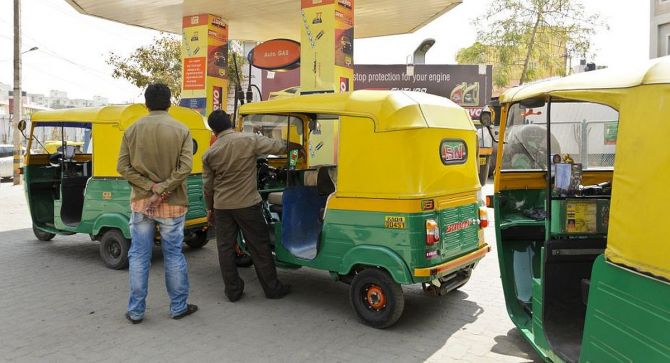The government has slashed by up to a fifth the supplies of cheaper gas to city gas entities that retail CNG to automobiles, increasing their dependence in costly imported fuel.

Buying costly imported gas to make up for the shortfall should result in a hike in CNG price but given the ensuing assembly elections in Maharashtra, that may be put off for now.
Indraprastha Gas Ltd and Mahanagar Gas Ltd in regulatory filings stated that supplies of domestically produced gas, which was available at a capped rate which is half of the imported price, has been cut.
"The company gets domestic gas allocation for meeting the requirement of CNG sales volumes at the pricing fixed by the government (presently at $6.5 per million British thermal unit).
"Based on communication received by the company from GAIL (India) Ltd (the nodal agency for domestic gas allocation), this is to inform that there has been a major reduction in domestic gas allocation to the company effective from October 16, 2024," IGL said in a filing.
The revised domestic gas allocation to IGL is about 21 per cent lesser than previous allocation, "which will have an adverse impact on profitability of the company", it said, adding it is in discussions with key stakeholders to minimise the impact.
Separately, MGL said as per Policy Guideline dated August 10, 2022, issued by the Ministry of Petroleum and Natural Gas, domestically produced Administrative Price Mechanisms (APM) natural gas is to be allocated to city gas distribution (CGD) companies for priority segments, specifically domestic piped natural gas and CNG (transport).
The policy states that the supply of domestic gas to CGD entities will be made only up to the quantity available and allocated to GAIL (India) limited for these segments.
"In line with this policy, the company was allocated APM natural gas for Domestic PNG and CNG (Transport) based on APM gas availability.
"Allocation to the company for CNG (Transport) has been reduced by 20 per cent, effective October 16, 2024, compared to previous average quarterly APM allocation," MGL said.
This, it said, being major reduction in allocation, will have an adverse impact on the profitability of the company.
"To bridge this shortfall, the company is exploring options of sourcing gas through domestically produced high pressure high temperature (HPHT) gas, new well/well intervention gas (NWG) from ONGC and benchmark-linked long-term gas contracts, so as to continue to provide gas to its customers with price stability," MGL added.
Commenting on the development, Girish Kadam, senior vice president & group head - corporate ratings, ICRA Limited, said, "The APM gas allocation has been reduced for the CGD sector by 20 per cent of the current domestic gas consumption by the sector.
"The reduction in APM allocation will have to be replaced by more expensive HPHT gas or (imported) LNG, which will push the overall gas costs for the sector."
In order to maintain contribution margins at existing levels, CNG prices would have to be increased by about Rs 5-5.5 per kg.
"The expected price rise may result in slower growth in the CNG vehicle registrations, which have been the key driver of CNG sales volume for the sector," he added.











 © 2025
© 2025